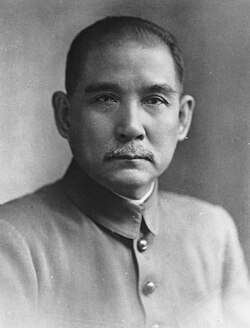Sun Yat-sen Quote
Japan today has become acquainted with the Western civilization of the rule of Might, but retains the characteristics of the Oriental civilization of the rule of Right. Now the question remains whether Japan will be the hawk of the Western civilization of the rule of Might, or the tower of strength of the Orient.
Sun Yat-sen
Japan today has become acquainted with the Western civilization of the rule of Might, but retains the characteristics of the Oriental civilization of the rule of Right. Now the question remains whether Japan will be the hawk of the Western civilization of the rule of Might, or the tower of strength of the Orient.
Related Quotes
This is a day of celebration!Today, we are divorcing the pastand marrying the present.Dance,and you will find Godin every room.Today, we are divorcing resentmentand marrying forgiveness.Sing,and God w...
Kamand Kojouri
Tags:
accept, acceptance, apathy, beloved, bitter, bitterness, celebrate, celebrating, celebration, ceremony
They took one look at me,And hated my black face.They took one look at me,And decided on my fate.They took one look at me,And forced an unknown fear.They took one look at me,And caused the shed of tea...
N'Zuri Za Austin
Tags:
acknowledge, all lives matter, black lives matter, bleed, bleeding, blood, conflict, erase, faith, harmony
About Sun Yat-sen
Sun Yat-sen (; 12 November 1866 – 12 March 1925) was a Chinese physician, revolutionary, statesman, and political philosopher who founded the Republic of China (ROC) and its first political party, the Kuomintang (KMT). As the paramount leader of the 1911 Revolution, Sun is credited with overthrowing the Qing imperial dynasty and served as the first president of the Provisional Government of the Republic of China (1912) and as the inaugural leader of the Kuomintang.
Born to a peasant family in Guangdong, Sun was educated overseas in Hawaii and returned to China to graduate from medical school in Hong Kong. He led underground anti-Qing revolutionaries in South China, the United Kingdom, and Japan as one of the Four Bandits and rose to prominence as the founder of multiple resistance movements, including the Revive China Society and the Tongmenghui. He is considered one of the most important figures of modern China, and his political life campaigning against Manchu rule in favor of a Chinese republic featured constant struggles and frequent periods of exile.
After the success of the 1911 Revolution, Sun proclaimed the establishment of the Republic of China but had to relinquish the presidency to general Yuan Shikai who controlled the powerful Beiyang Army, ultimately going into exile in Japan. He later returned to launch a revolutionary government in southern China to challenge the warlords who controlled much of the country following Yuan's death in 1916. In 1923, Sun invited representatives of the Communist International to Guangzhou to reorganize the KMT and formed the First United Front with the Chinese Communist Party (CCP). He did not live to see his party unify the country under his successor, Chiang Kai-shek, in the Northern Expedition. While residing in Beijing, Sun died of gallbladder cancer in 1925.
Uniquely among 20th-century Chinese leaders, Sun is revered in both Taiwan (where he is officially the "Father of the Nation") and in the People's Republic of China (where he is officially the "Forerunner of the Revolution") for his instrumental role in ending Qing rule and overseeing the conclusion of the Chinese dynastic system. His political philosophy, known as the Three Principles of the People, sought to modernise China by advocating for nationalism, democracy, and the livelihood of the people in an ethnically harmonious union (Zhonghua minzu). The philosophy is commemorated as the National Anthem of the Republic of China, which Sun composed.
Born to a peasant family in Guangdong, Sun was educated overseas in Hawaii and returned to China to graduate from medical school in Hong Kong. He led underground anti-Qing revolutionaries in South China, the United Kingdom, and Japan as one of the Four Bandits and rose to prominence as the founder of multiple resistance movements, including the Revive China Society and the Tongmenghui. He is considered one of the most important figures of modern China, and his political life campaigning against Manchu rule in favor of a Chinese republic featured constant struggles and frequent periods of exile.
After the success of the 1911 Revolution, Sun proclaimed the establishment of the Republic of China but had to relinquish the presidency to general Yuan Shikai who controlled the powerful Beiyang Army, ultimately going into exile in Japan. He later returned to launch a revolutionary government in southern China to challenge the warlords who controlled much of the country following Yuan's death in 1916. In 1923, Sun invited representatives of the Communist International to Guangzhou to reorganize the KMT and formed the First United Front with the Chinese Communist Party (CCP). He did not live to see his party unify the country under his successor, Chiang Kai-shek, in the Northern Expedition. While residing in Beijing, Sun died of gallbladder cancer in 1925.
Uniquely among 20th-century Chinese leaders, Sun is revered in both Taiwan (where he is officially the "Father of the Nation") and in the People's Republic of China (where he is officially the "Forerunner of the Revolution") for his instrumental role in ending Qing rule and overseeing the conclusion of the Chinese dynastic system. His political philosophy, known as the Three Principles of the People, sought to modernise China by advocating for nationalism, democracy, and the livelihood of the people in an ethnically harmonious union (Zhonghua minzu). The philosophy is commemorated as the National Anthem of the Republic of China, which Sun composed.
